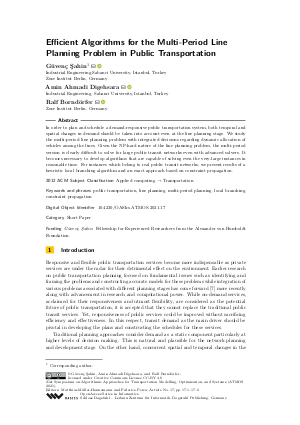Efficient Algorithms for the Multi-Period Line Planning Problem in Public Transportation (Short Paper)
Authors
Güvenç Şahin  ,
Amin Ahmadi Digehsara
,
Amin Ahmadi Digehsara  ,
Ralf Borndörfer
,
Ralf Borndörfer 
-
Part of:
Volume:
21st Symposium on Algorithmic Approaches for Transportation Modelling, Optimization, and Systems (ATMOS 2021)
Part of: Series: Open Access Series in Informatics (OASIcs)
Part of: Conference: Symposium on Algorithmic Approaches for Transportation Modelling, Optimization, and Systems (ATMOS) - License:
 Creative Commons Attribution 4.0 International license
Creative Commons Attribution 4.0 International license
- Publication Date: 2021-09-27
File

PDF
OASIcs.ATMOS.2021.17.pdf
- Filesize: 489 kB
- 6 pages
Document Identifiers
Subject Classification
ACM Subject Classification
- Applied computing → Transportation
Keywords
- public transportation
- line planning
- multi-period planning
- local branching
- constraint propagation
Metrics
- Access Statistics
-
Total Accesses (updated on a weekly basis)
0Document
0Metadata
Abstract
In order to plan and schedule a demand-responsive public transportation system, both temporal and spatial changes in demand should be taken into account even at the line planning stage. We study the multi-period line planning problem with integrated decisions regarding dynamic allocation of vehicles among the lines. Given the NP-hard nature of the line planning problem, the multi-period version is clearly difficult to solve for large public transit networks even with advanced solvers. It becomes necessary to develop algorithms that are capable of solving even the very-large instances in reasonable time. For instances which belong to real public transit networks, we present results of a heuristic local branching algorithm and an exact approach based on constraint propagation.
Cite As Get BibTex
Güvenç Şahin, Amin Ahmadi Digehsara, and Ralf Borndörfer. Efficient Algorithms for the Multi-Period Line Planning Problem in Public Transportation (Short Paper). In 21st Symposium on Algorithmic Approaches for Transportation Modelling, Optimization, and Systems (ATMOS 2021). Open Access Series in Informatics (OASIcs), Volume 96, pp. 17:1-17:6, Schloss Dagstuhl – Leibniz-Zentrum für Informatik (2021)
https://doi.org/10.4230/OASIcs.ATMOS.2021.17
BibTex
@InProceedings{sahin_et_al:OASIcs.ATMOS.2021.17,
author = {\c{S}ahin, G\"{u}ven\c{c} and Ahmadi Digehsara, Amin and Bornd\"{o}rfer, Ralf},
title = {{Efficient Algorithms for the Multi-Period Line Planning Problem in Public Transportation}},
booktitle = {21st Symposium on Algorithmic Approaches for Transportation Modelling, Optimization, and Systems (ATMOS 2021)},
pages = {17:1--17:6},
series = {Open Access Series in Informatics (OASIcs)},
ISBN = {978-3-95977-213-6},
ISSN = {2190-6807},
year = {2021},
volume = {96},
editor = {M\"{u}ller-Hannemann, Matthias and Perea, Federico},
publisher = {Schloss Dagstuhl -- Leibniz-Zentrum f{\"u}r Informatik},
address = {Dagstuhl, Germany},
URL = {https://drops.dagstuhl.de/entities/document/10.4230/OASIcs.ATMOS.2021.17},
URN = {urn:nbn:de:0030-drops-148863},
doi = {10.4230/OASIcs.ATMOS.2021.17},
annote = {Keywords: public transportation, line planning, multi-period planning, local branching, constraint propagation}
}
Author Details
- Industrial Engineering,Sabanci University, Istanbul, Turkey
- Zuse Institut Berlin, Germany
Funding
- Şahin, Güvenç: Fellowship for Experienced Researchers from the Alexander von Humboldt Foundation.
References
-
Stefan Bunte and Natalia Kliewer. An overview on vehicle scheduling models. Public Transport, 1(4):299-317, 2009.

-
George B. Dantzig, Delbert R. Fulkerson, and Selmer M. Johnson. Solution of a large-scale traveling-salesman problem. Journal of the Operations Research Society of America, 2(4):393-410, 1954.

-
Matteo Fischetti and Andrea Lodi. Local branching. Mathematical Programming, 98(1):23-47, 2003.

-
Johann Hartleb and Marie Schmidt. A rolling horizon heuristic with optimality guarantee for an on-demand vehicle scheduling problem. In Dennis Huisman and Christos D. Zaroliagis, editors, 20th Symposium on Algorithmic Approaches for Transportation Modelling, Optimization, and Systems (ATMOS 2020), volume 85 of OpenAccess Series in Informatics (OASIcs), pages 15:1-15:18, Dagstuhl, Germany, 2020. Schloss Dagstuhl-Leibniz-Zentrum für Informatik.

-
Ulrich Pferschy and Rostislav Staněk. Generating subtour elimination constraints for the TSP from pure integer solutions. Central European Journal of Operations Research, 25:231-260, 2017.

-
Güvenç Şahin, Amin Ahmadi Digehsara, Ralf Borndörfer, and Thomas Schlechte. Multi-period line planning with resource transfers. Transportation Research Part C: Emerging Technologies, 119:102726, 2020.

-
Anita Schöbel. An eigenmodel for iterative line planning, timetabling and vehicle scheduling in public transportation. Transportation Research Part C: Emerging Technologies, 74:348-365, 2017.

-
Linus Schrage. A Guide to Optimization-Based Multiperiod Planning, chapter 3, pages 50-63. INFORMS, 2018.

-
Luis M. Torres, Ramiro Torres, Ralf Borndörfer, and Marc E. Pfetsch. Line planning on tree networks with applications to the quito trolebús system. International Transactions in Operational Research, 18(4):455-472, 2011.

